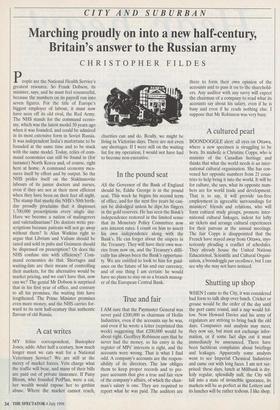CITY AND SUBURBAN
Marching proudly on into a new half-century, Britain's answer to the Russian army
CHRISTOPHER FILDES
People are the National Health Service's greatest resource. So Frank Dobson, its minister, says, and he must feel resourceful, because the numbers on its payroll run into seven figures. For the title of Europe's biggest employer of labour, it must now have seen off its old rival, the Red Army. The NHS stands for the command econo- my, which was the latest model 50 years ago when it was founded, and could be admired in its most extensive form in Soviet Russia. It was independent India's misfortune to be founded at the same time and to be stuck with the same model. Today, relics of com- mand economies can still be found in (for instance) North Korea and, of course, right here at home. A command economy mea- sures itself by effort and by output. So the NHS prides itself on the Stakhanovite labours of its junior doctors and nurses, even if they are not at their most efficient when they have been on their feet all night. The stamp that marks the NHS's 50th birth- day proudly proclaims that it dispenses 1,700,000 prescriptions every single day. Have we become a nation of malingerers and valetudinarians? Do doctors write pre- scriptions because patients will not go away without them? Is Alan Watkins right to argue that Librium and Valium should be taxed and sold in pubs and Guinness should be dispensed on prescription? Or does the NHS confuse size with efficiency? Com- mand economies do that. Shortages and waiting-lists are their means of controlling their markets, for the alternative would be market pricing, and we can't have that, now can we? The genial Mr Dobson is surprised that in his first year of office, and contrary to all his promises, the waiting lists have lengthened. The Prime Minister promises even more money, and the NHS carries for- ward to its next half-century that authentic flavour of old Russia.














































































































 Previous page
Previous page